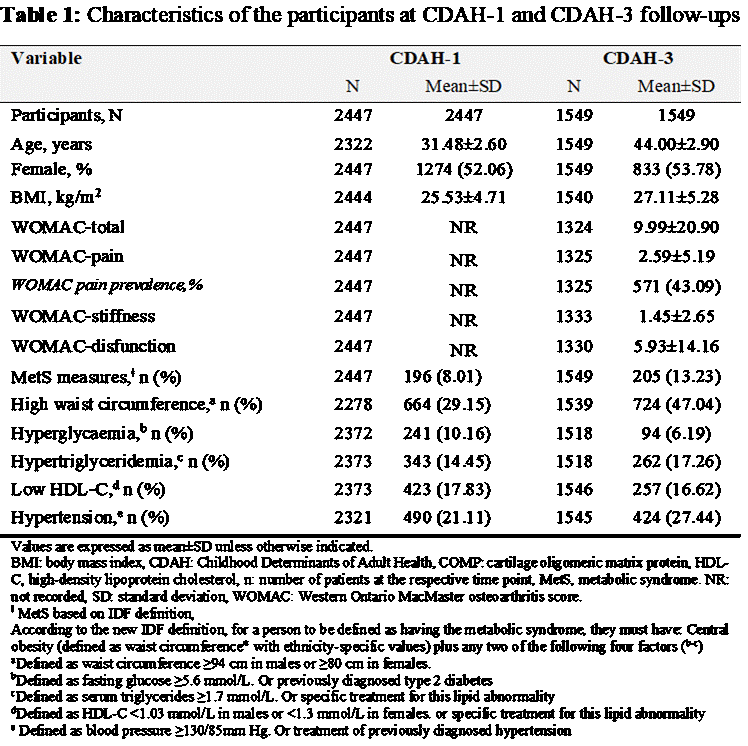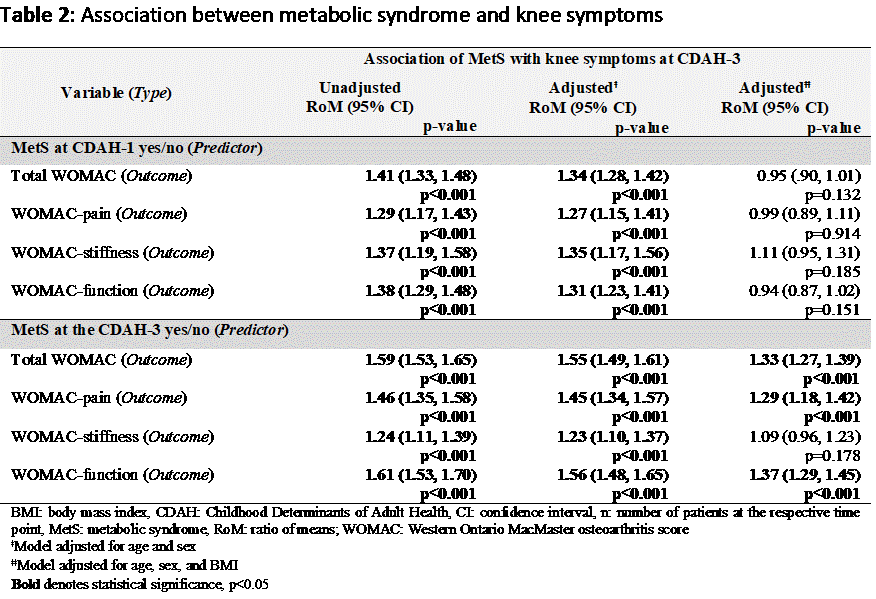Session Information
Session Type: Poster Session B
Session Time: 9:00AM-10:30AM
Background/Purpose: Metabolic syndrome (MetS) is characterised by the clustering of central obesity with metabolic abnormalities. MetS has been suggested as having a role in osteoarthritis (OA) pathogenesis. Several studies have described the association of MetS with joint pain in older adults with OA; however, none has described the association between MetS and knee pain in a middle-aged population. We aimed to describe the association of MetS and trajectories of MetS over 10-13 years with knee symptoms in general population-based middle-aged adults.
Methods: Fasting blood biochemistry, waist circumference and blood pressure measures collected during the Childhood Determinants of Adult Health (CDAH)-1 study (year:2004-6; n=2447; mean age:31.48±2.60) and at 10-13 year follow-up at CDAH-3 (year:2014-2019; n=1549; mean age:44±2.90). Participants were defined as having MetS—as per International Diabetes Federation (IDF) definition—if they have central obesity and any two of the other four factors—elevated triglycerides, reduced high-density lipoprotein (HDL), hypertension and hyperglycaemia. Participants were grouped in four MetS trajectories—’No MetS’: no MetS at either life stage; ‘Improved MetS’: MetS only at young adulthood (CDAH-1); ‘Incident MetS’: MetS only at mid-adulthood (CDAH-3); and ‘Persistent MetS’: MetS at both life stages. Knee symptoms were assessed using the Western Ontario and McMaster Universities Osteoarthritis Index (WOMAC) scale at the CDAH-3 (mid-adulthood). Univariable and multivariable (adjusted for age, sex, and body mass index (BMI)) zero-inflated Poisson (ZIP) regression models were used for analysis.
Results: Overall, the prevalence of MetS increased from 8% at young adulthood (female:52.06%) to 13% in mid-adulthood (female:53.78%) over 10-13 years (Table 1). Presence of MetS at mid-adulthood was associated with knee symptoms at mid-adulthood [ratio of means (RoM): 1.33; 95%CI:1.27, 1.39] (Table 2). Four MetS trajectories were identified—’No MetS’ (85.01%); ‘Improved MetS’ (2.14%), ‘Incident MetS’ (8.81%), and ‘Persistent MetS, (4.04%). Compared to ‘No MetS’ ‘Persistent MetS’ [RoM:1.15; 95%CI:1.06,1.25], ‘Incident MetS’ [RoM:1.56; 95%CI:1.48,1.65], and ‘Improved MetS’ [RoM:1.22; 95%CI:1.05,1.41] was associated with higher knee symptoms (Table 3). Notably, ‘Incident MetS’ was most strongly associated with knee symptoms [RoM: 1.56; 95%CI: 1.48,1.65] and pain [RoM:1.52; 95%CI:1.37,1.70] at follow-up (Table 3).
Conclusion: In middle-aged adults, there was an independent positive association between MetS and knee symptoms. Relative to those without MetS at either life stage, the elevation in mean knee pain scores was more pronounced for those who developed MetS after young adulthood than those who had MetS in young adulthood.
To cite this abstract in AMA style:
Singh A, Fraser B, Venn A, Blizzard L, Ding C, Antony B. Association Between Metabolic Syndrome and Knee Pain over 10-13 Years in Middle-Aged Adults [abstract]. Arthritis Rheumatol. 2022; 74 (suppl 9). https://acrabstracts.org/abstract/association-between-metabolic-syndrome-and-knee-pain-over-10-13-years-in-middle-aged-adults/. Accessed .« Back to ACR Convergence 2022
ACR Meeting Abstracts - https://acrabstracts.org/abstract/association-between-metabolic-syndrome-and-knee-pain-over-10-13-years-in-middle-aged-adults/



